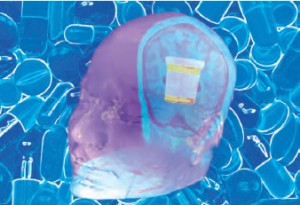➣ By Ariana Anderson

Measuring the placebo effect using neuroimaging would lead to significantly lower costs in drug development
A sugar pill can regrow hair in a study on baldness; sham knee surgery can reduce pain comparably to real surgery. During World War II, a nurse injected a wounded soldier with salt water after heavy casualties depleted morphine supplies, giving the soldier enough pain relief to make it through surgery. The placebo effect describes this remarkable phenomenon that applying a treatment, any treatment, is likely to produce the desired results in medicine.
To test whether a given medication is superior to merely giving out optimism, disguised as a sugar pill, during drug trials patients often must either be divided into two treatment groups, or tested twice, once on active medicine and once when given placebo medications. Although the placebo effect has known psychological correlates that make some people react more strongly than others, measuring the placebo effect without actually applying a placebo treatment has not previously been possible.
Recognizing this, Ariana Anderson and Mark Cohen from UCLA at the Laboratory of Integrative Neuroscience in the department of Psychiatry have developed a method of isolating and measuring the placebo effect in the brain using functional MRI. If the placebo has a consistent footprint its change can be measured during a trial. More significant “placebo” activations in the brain correspond to higher levels of the placebo effect within a patient. This means that the placebo effect can be quantified indirectly in people receiving a treatment, opening the possibility that drug trials may be run with only half the patients currently needed. With per-drug bench-to-bedside costs measured in the hundreds of millions of dollars, the savings could be dramatic. “Orphan drugs” are those developed for rare diseases. Typical drug trials require large numbers of patients to establish significance. When diseases affect only a few thousand patients, problems in recruiting enough subjects can make adequate tests impractical. This, combined with the problems of cost, often means that potentially effective treatments are abandoned. When patients can serve as their own “matched control” however, the effect of the drug could be measured within a patient while adjusting for the placebo effect. Moreover it often is considered unethical to assign a patient who has a terminal disease to a placebo. Using medical imaging to measure the placebo effect could promote drug development for such patient groups with rare, yet lethal, disorders.
This new technology harnesses mathematical and statistical methods to learn what networks are activated in the brain after a patient receives either an active or sham medication, but not before. By isolating these patterns, changes in this brain activity can be measured before, during, and after treatment, yielding a measure of how strongly the placebo is expected to act in a person, allowing the placebo effects to be removed from the analysis. Simulated trial results have shown up to 40% reduction in patient recruitment necessary for drug trials, leading to more efficient and less costly drug development in the future.
Ariana Anderson Ph.D.
The Semel Institute UCLA
Los Angeles, CA
ariana82@ucla.edu
About Brenda Wiederhold
President of Virtual Reality Medical Institute (VRMI) in Brussels, Belgium.
Executive VP Virtual Reality Medical Center (VRMC), based in San Diego and Los Angeles, California.
CEO of Interactive Media Institute a 501c3 non-profit
Clinical Instructor in Department of Psychiatry at UCSD
Founder of CyberPsychology, CyberTherapy, & Social Networking Conference
Visiting Professor at Catholic University Milan.









